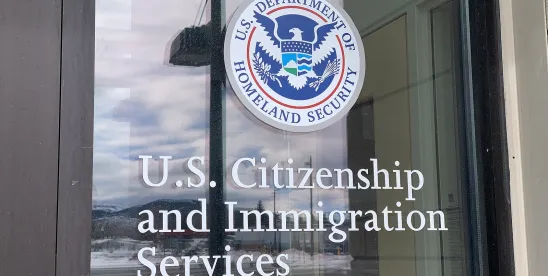In recent months, U.S. Citizenship and Immigration Services (USCIS) has sent notices of intent to terminate (NOITs) to EB-5 regional centers that have not paid the “Integrity Fees” implemented by the 2022 EB-5 Reform and Integrity Act (RIA).
Congress introduced these annual Integrity Fees to help pay for many of the new integrity measures, such as USCIS site visits, audits, and overseas investigations. Depending on the number of EB-5 investors that the regional center sponsors, the Integrity Fee is either $20,000 per year or $10,000 per year.
The USCIS roll-out of the RIA has been confusing for some stakeholders. USCIS announced on March 2, 2023, almost a year after the RIA’s passage, that the first Integrity Fee payment must be paid between March 2, 2023 (the same day as the announcement) and April 3, 2023. However, given the short notice and confusion that arose over how the fees should be calculated, USCIS kept the Integrity Fee payment portal open beyond the April 3 due date. Due to a continued lack of clarity, USCIS eventually announced an Oct. 1, 2023, due date for both the FY 2023 and FY 2024 Integrity Fees. USCIS also confirmed on its website that it would take steps to terminate any regional center that, on or before Dec. 30, 2023, had not paid the required Integrity Fees for FY 2023 and FY 2024. USCIS only published these announcements on its website; it did not send the regional centers notices about these deadlines.
Now approximately seven months later, regional centers are receiving NOITs for failure to pay the Integrity Fees. Some regional centers have made a deliberate decision not to pay the Integrity Fees as a “wind down” measure; USCIS clarified on its website that if a regional center did not pay the Integrity Fees and the regional center’s designation was terminated as a result, sponsored EB-5 investors who filed I-526 petitions prior to the March 2022 passage of the RIA (Pre-RIA Investors) could still have their I-526 and I-829 petitions approved on the merits if all other eligibility criteria were met, e.g., job creation.
However, other regional centers may have wanted to remain designated under the RIA but were not aware of the Integrity Fee due date before receiving a NOIT. Moreover, the NOIT states that USCIS will not accept any late payments, so these regional centers cannot cure the payment issue in response to the NOIT, even if they wish to remain designated.
New investors who filed I-526E petitions with a designated regional center after the passage of the RIA (RIA Investors) may face denial of their I-526E petitions if the regional center’s designation is terminated. Such investors must follow the “amendment” process provided in the RIA and associate with a new regional center in good standing. However, USCIS has not promulgated any regulations about this process, and investors could face thousands of dollars in fees to associate with a new regional center despite the issue arising on behalf of regional centers, not investors.
The RIA states that USCIS must impose a reasonable penalty on regional centers that fail to pay the Integrity Fees within 30 days of the due date and must terminate a regional center’s designation if it does not pay within 90 days after the due date. USCIS only started mailing NOITs to regional centers who did not pay the Integrity Fees in July 2024, seven months after the fees were due. It does not appear that USCIS informed regional centers about any penalties as was required prior to sending the NOITs. Had they done so, regional centers would have known that the fee was due and that they could be terminated if they did not pay by the Dec. 30, 2023, deadline.
As a result, some regional centers that wish to remain designated now face termination with no way to cure the nonpayment. A lawsuit seeking a preliminary injunction was filed in federal court in Montana that challenged USCIS’s action to terminate a regional center without mailing any notice or imposing a reasonable penalty prior to initiating a termination proceeding. The judge in that case held that USCIS appeared to act arbitrarily when it determined multiple times that it had the discretion to change the deadline for the Integrity Fee payment and not impose late fees, but could not be flexible on its decision to terminate the centers. It is not yet clear whether USCIS will appeal the decision or change its position and exercise its discretion to allow late Integrity Fee payments.
Many EB-5 stakeholders, including industry groups and bar associations, are petitioning USCIS to allow such late payments by those regional centers that wish to remain designated. Allowing late Integrity Fee payments would bring in more fees to the Integrity Fund to allow for additional investigations and audits. Moreover, if these regional centers maintain their designation, they must participate in the annual compliance process with USCIS, whereby the regional center will report to the government on the progress of its projects, which would likely contribute to the overall integrity of the EB-5 program.



 />i
/>i
